 W
WThea Altaras was a Croatian-German architect who was known by her research and publications on Jewish monuments in Hesse, Germany.
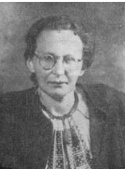 W
WBerta Bergman was a Yugoslav physician and the first Bosnian woman to finish high school.
 W
WVera Blagojević was a Yugoslav medical student and Communist political activist. During World War II, she was captured by the Gestapo in 1942 and later killed. She was posthumously awarded the Order of the People's Hero in 1953.
 W
WMaja Bošković-Stulli was a Croatian slavicist and folklorist, literary historian, writer, publisher and an academic, noted for her extensive research of Croatian oral literature.
 W
WMagda Bošković was a Croatian communist, Partisan and member of the women's rights movement.
 W
WJovanka Broz was First Lady of Yugoslavia as the wife of Yugoslav leader Josip Broz Tito. She was a lieutenant colonel in the Yugoslav People's Army.
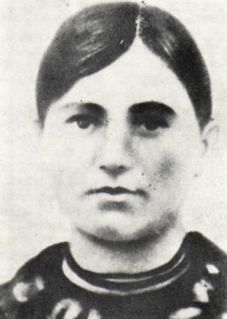 W
WMarija Bursać was a member of the Yugoslav Partisans during World War II in Yugoslavia and the first woman proclaimed a People's Hero of Yugoslavia. Bursać was born to a Bosnian Serb farming family in the village of Kamenica, near Drvar. After the invasion of Yugoslavia by the Axis powers and their creation of the Independent State of Croatia in April 1941, Bursać supported the Partisan resistance movement led by the Communist Party of Yugoslavia (KPJ). Like other women in her village, she collected food, clothing, and other supplies for the Partisan war effort. Bursać became a member of the League of Communist Youth of Yugoslavia in September 1941. The following August she was appointed political commissar of a company of the 1st Krajina Agricultural Shock Brigade, which harvested crops in the Sanica River valley, and was admitted to the KPJ at the end of that summer.
 W
WAnka Butorac was a Croatian communist who died in World War II and was proclaimed a People's Hero of Yugoslavia.
 W
WBožidarka "Kika" Damjanović-Marković was a Yugoslav Partisan commander as a participant in the Second World War in Yugoslavia.
 W
WNada Dimić was a Yugoslav communist who died in World War II and was proclaimed a People's Hero of Yugoslavia.
 W
WAlenka Gerlovič was a Slovene painter.
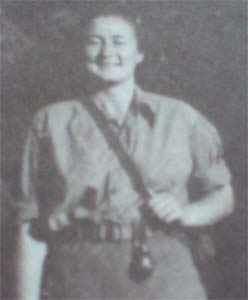 W
WEva Grlić was Croatian journalist and writer, mother of famous Croatian film director and producer Rajko Grlić.
 W
WHerta Haas was a Slovene and Yugoslav Partisan during World War II and the second wife of Josip Broz Tito, leader of the Partisans and a future President of Yugoslavia.
 W
WElizabeta "Lizika" Jančar was a Slovene Partisan.
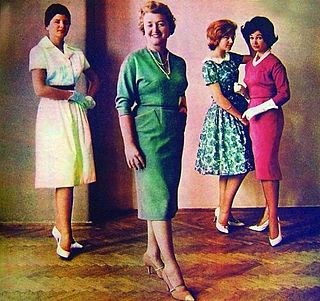 W
WŽuži Jelinek was a Hungarian-born Croatian fashion stylist, designer and writer.
 W
WElpida Karamandi was born on 1 January 1920, in Florina, Greece in an Aromanian family. Her mother was divorced from her husband and moved to her relatives in Bitola, then in the Kingdom of Yugoslavia, where she remarried. Elpida grew up and was educated in Bitola and later continued her studies in Belgrade, where she became a member of SKOJ in 1939. When the Second World War began, Elpida was back in Bitola. In June 1941 she joined the Yugoslav Communist Party, but her activities were detected by the Bulgarian police and she was arrested. On her release Elpida resumed her resistance work against the occupiers.
 W
WFana Kochovska - Cvetkovik was a Macedonian communist, fighter and national hero. She was the youngest named National Hero of Yugoslavia.
 W
WKozarčanka is a World War II photograph that became iconic in the Socialist Federal Republic of Yugoslavia. Shot by Yugoslav artistic photographer Žorž Skrigin in northern Bosnia during the winter of 1943–44, it shows a smiling female Partisan wearing a Titovka cap and with a rifle slung over her shoulder.
 W
WVahida Maglajlić was a Yugoslav Partisan recognized as a People's Hero of Yugoslavia for her part in the struggle against the Axis powers during World War II. She was the only Bosnian Muslim woman to receive the order.
 W
WHaim Estreya Ovadya was a Macedonian Jewish communist who joined the Yugoslav Partisans after the German invasion of Yugoslavia in 1941 during World War II.
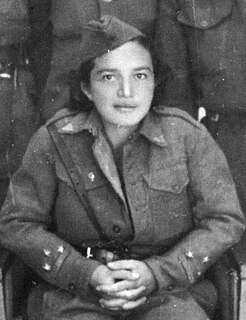 W
WRoza Papo (1914–1984) was a Yugoslav physician and general of the Yugoslav People's Army. She was the first woman to rise to the rank of general on the Balkan Peninsula.
 W
WNevenka Petrić was a Serbian writer, poet, educationalist, and expert in the fields of family planning and gender relations. She joined the Partisans at the age of 14. She became a youth leader and then a head of Health and Social Policy in Yugoslavian local government. She was a member of the Yugoslav women's assembly, secretary of the Conference for Social Activity of Yugoslav Women (1961–69), and president of the Family Planning Council of Yugoslavia (1968–76). She represented Europe on the Central Council of the International Planned Parenthood Federation, and was president of that body's European committee for education. She assisted the United Nations Population Fund's research projects and also directed a UN course on gender relations and parenthood for students from developing countries.
 W
WMilka Planinc was a Croatian politician active in SFR Yugoslavia. She served as Prime Minister of the Socialist Federal Republic of Yugoslavia from 1982 to 1986, the first and only woman to hold this office. Planinc was the first female head of government in a diplomatically recognized Communist state, with the first in a partially recognized Communist country being Khertek Anchimaa-Toka of the Tuvan People's Republic, who was also the first female non-hereditary head of state.
 W
WElza Polak was a Yugoslav horticulturist and gardener. She is considered one of the pioneers of modern horticulture in Croatia.
 W
WStana Tomašević (1920–1983) was a Yugoslav Partisan officer during World War II, a model, and a Yugoslav politician and diplomat, serving as president of the Federal Chamber from 1979–82.
 W
WVera Jocić was a Yugoslav partisan and People's Hero of Yugoslavia.
 W
WRada Vranješević was a Yugoslav political activist and resistance leader in Bosnia during the Second World War.